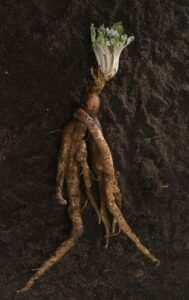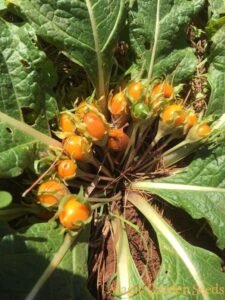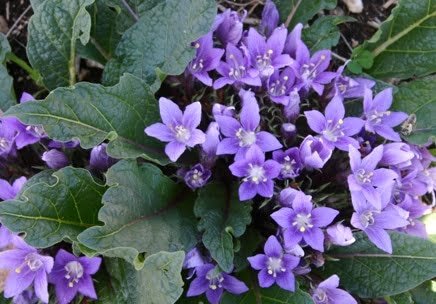Have you heard of the mandrake? It is said that it is a magical plant. The reason for this statement is the circumstance in which its appearance is revealed in two of the most explored biblical passages. But will this be true? In a moment we will tell you where and why the mandrake appears in the bible, and whether or not it has magical powers as many says.
God warns in the scriptures about sorcery, and superstition has a lot to do with it. Sometimes we give our wishes to supposedly magical elements and not to God, who is the true miracle worker.
One of the most notable myths is that of the mandrake, and people hide behind its appearance in the Bible to say a string of meaningless things that throughout this article we are going to analyze and deny, of course, on biblical grounds.
Where does the mandrake appear in the bible?
In Song of Solomon 7:13 we find:
“The mandrakes send forth their fragrance, / and at our door is every delicacy, new and old, / that I have kept for you, my beloved.”

In the ancient world, mandrake roots were considered an aphrodisiac and were commonly prepared and consumed as a fertility drug. There are many references to mandrakes in folklore and superstitions in various cultures.
Song of Solomon 7:13
The mention of mandrakes in the Song of Songs is part of a romantic encounter between Solomon and his new wife. These plants were around them in the field, along with grapes, pomegranates, and “all delicacies” ( Song of Solomon 7:13 ).
Mandrakes provide a fragrance and, given their reputation as an aphrodisiac, suggest intimacy. The full description in verses 10-13 is of a romantic setting that enhances the desire of the husband and wife and promotes a sexual encounter.
In this scene related to the appearance of the mandrake in the Bible, the Shulammite invites King Solomon to meet her for an outdoor date first thing in the morning:
“Let us go early to the vineyards to see if the vines have budded if their flowers have opened, and if the pomegranates are in bloom – there I will give you my love” ( Song of Solomon 7:12 ).
The description of this romantic time is full of beautiful images, including the mention of mandrakes in the verses that follow, while the husband and wife enjoy themselves among the vineyards.
Genesis 30
The other biblical story to talk about the mandrake in the bible is found in Genesis 30. There, Jacob’s two wives, Rachel and Leah, compete for Jacob’s attention. Rachel wants a child and Leah wants more children. Rubén, Lea’s son, finds mandrakes in the field and gives them to his mother.
Leah then trades the mandrakes to Rachel for the chance to sleep with Jacob that night ( Genesis 30:14-16 ). Rachel, still childless, agrees to the exchange, believing the mandrakes would help her conceive later on. Leah sleeps with Jacob that night and becomes pregnant with her fifth child ( verse 17 ).
Does mandrake cure infertility?
Mandrake has been desired in many cultures due to the belief that it is an aphrodisiac and promotes fertility. These qualities, along with the fact that they were rarely found in Paddan-Aram, where they lived ( Gen. 28:5 ), explain why both Leah and Rachel desired the plant.
Rachel herself had been childless, Leah had become temporarily infertile ( 29:31–30:13 ), and they both looked to the mandrake for a cure. Once again, the main players in the chapter don’t come off so positively. Both Rachel and Leah were showing superstition by putting their hope in a plant without asking God’s blessing on the potential medicine ( Ps. 113:9 ).
CHECKOUT:
- Short and powerful Prayers for healing and recovery
- 5 signs when God wants to move you to bigger blessings.
- Solomon 3:4 Meaning of “I Have Found the One My Soul Loves”
It is no wonder that Leah accuses Rachel of stealing from her husband since Jacob’s deep and sinful neglect of Leah ( 1 Cor. 7:1-5 ) is evident in his willingness to trade the rare mandrakes for a single night. with the.
Rachel, in a sense, prostitutes Jacob by offering him to Leah for the desired fruit (Genesis 30:15) and is clearly more concerned with having children of her own than with her sister’s welfare. Both women are willing to negotiate for sexual and relational intimacy, things that should never be negotiated so rudely.
Moses tells us that God listened to Leah and gave her a son even though her prayer is not recorded (Vv. 16-17). Ironically, the blessing of fertility does not come to the one who ate the “magical” fruit, but to the one who gave it away.
With these two facts, the Lord shows his people that their superstitions are worthless because He is sovereign over procreation. Still, Leah shows us how God often blesses us with compassion, even when we act manipulatively to get our way.
What is mandrake?

As the mandrake is described in the Bible, it is a plant that often grows as a weed in wheat fields.
This is made up of several large, wrinkled, dark green leaves that lie flat on the ground in a rosette. A cluster of attractive violet flowers appears in the center of this rosette in winter.
The root of the mandrake (Mandragora officinarum) can be several feet long and weigh several pounds. It takes on strange, often human-like forms, and for this reason, it is highly prized by the superstitious.
The fruits, as stated in the Song of Songs, are produced in early summer and have a very attractive fragrance.
What does God think of this?
Many scriptures warn God’s people about sorcery, astrology, and other such practices (Exodus 22:18; Revelation 22:15). Most of us probably don’t partake in such things, but superstitions are still a part of many Christian lives.
For example, some believers think that praying the same prayer every day will guarantee a certain result. Take care to eliminate all superstitions from your life and trust in the sovereign will of the Lord that works for your good.
Conclusion:
As you have noticed, if we carefully analyze the appearances of the mandrake in the Bible, we can realize that it is not a magical plant, it is simply an exotic species with a very particular shape that attracts superstitious people.
In fact, curiously, the one that conceived at the beginning was Lea (who had exchanged mandrakes for one night with her husband), so I ask you, was it the plant that achieved the miracle of conception? With everything we have talked about, surely you already have the answer. May God fill you with blessings and may you drive away all superstitious thoughts.

